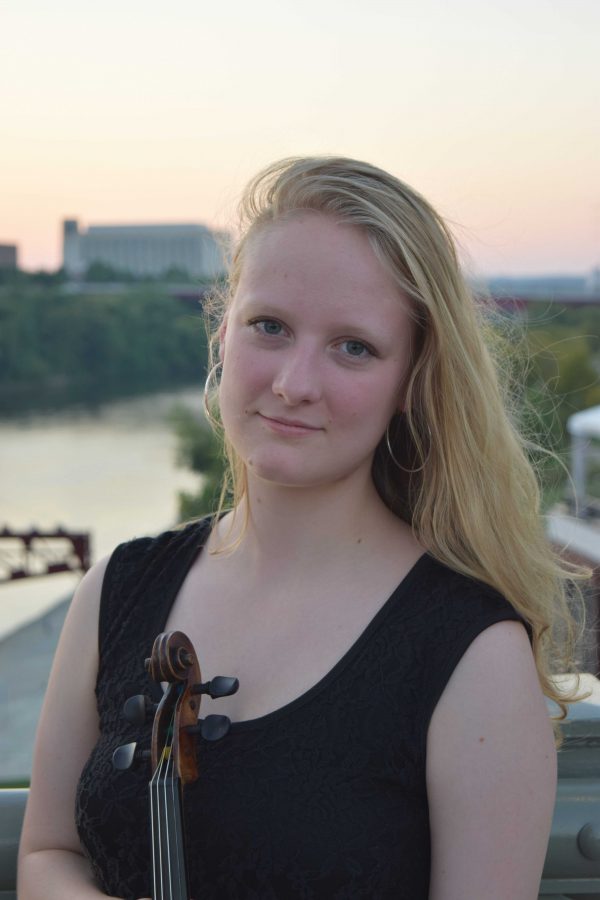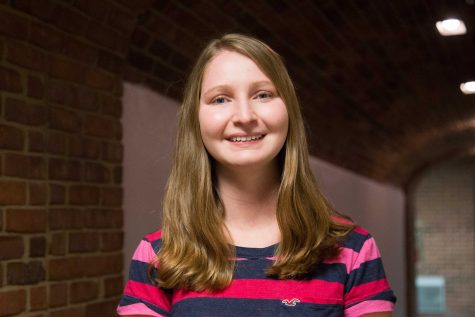Senior Violin Performance major Mary Grace Johnson recently won the Music Teachers National Association (MTNA) Young Artist Performance String Competition. The finals were the culmination of three increasingly prestigious rounds.
Johnson, a violinist since age five, plans on attending graduate school for violin performance in the fall. The Hustler had the chance to hear from Johnson about MTNA and her musical career.
Vanderbilt Hustler: Can you tell me about the pieces you played? What were the challenges in learning them, and what do you like and dislike about them?
Mary Grace Johnson: I played a 40-minute program—the first movement of the Sibelius Violin Concerto, the Grave and Allegro from Bach’s Sonata in A minor for Solo Violin, Paganini Caprice No. 15, and Grażyna Bacewicz Sonata No. 2 for solo violin.
Sibelius has been my favorite violin concerto for a long time, and last year I got to play it with the Vanderbilt Orchestra after winning the concerto competition. At this point, I’ve performed it so much it feels like part of me. I still love it, but I’m ready to take a break from it for a while. The Bach is challenging because I feel like every time I play, it comes out differently. I’ve changed my mind so many times about my interpretations, but that also keeps it fresh and interesting.
The Paganini was definitely the most challenging thing on the program for me. Paganini is all about flashy technique, and that’s not really my playing style. Working on it this year was definitely a struggle, but I did make several breakthroughs. I want to keep working on Paganini caprices because they challenge me so much. It’s like exercise and eating your vegetables: the process isn’t that enjoyable, but the end result is worth it. My favorite piece on the program was the sonata by Bacewicz. Bacewicz was a female Polish composer and wrote the piece in 1958. I loved working on a piece by a woman, and it’s a pretty unknown work—it’s cool to work on something that people don’t know because you can make a really original interpretation and get the audience interested in a new composer. I love promoting underplayed music, especially works by women.
VH: Were you nervous to compete?
MGJ: I actually really like competing—probably more than any other type of performing. A lot of times when I perform, I overanalyze and focus on my mistakes and what I want to do better next time. When I compete, however, I’m able to just let mistakes go and live in the moment and really perform, because I know it’s my only opportunity to play for those people and there is no next time. Because of that, I don’t really get nervous, at least in the sense that I’m afraid I’m going to make a mistake. Mistakes will happen, but people are listening for music, so that’s what I aim to present. If the judges are looking for technical perfection, they can pick someone else.
VH: Has your mindset towards performing changed over the years?
MGJ: I used to have really bad performance anxiety—I would get so nervous I would throw up, my arms would shake so badly that I couldn’t hold my bow, and I struggled with playing things from memory. Over the years, I realized that usually I felt the most nervous about performing when I was the least prepared. Performance for me now is as much about the preparation as it is the actual moment, and I’ve come up with a method that really works for me. I make sure I practice mindfully so that I have a plan for every note that I play and don’t have a chance to doubt myself on stage. To practice memory, I play things at quarter tempo and go note by note, as if studying for a test, making sure I’m never just relying on muscle memory. Before a recital or competition, I make sure that I do several mock performances in front of an audience, to try to mimic the conditions as much as possible. On the performance day itself, I always play every note that I’m going to be presenting. It makes me feel more secure having played everything exactly the way I want it already and have that confidence going into the performance. I always finish my warm-up by playing the first page or so of the piece that’s first on my program, so that it’s super fresh and in my fingers right before I go on stage.
VH: How do you think Blair has prepared you for life after college?
MGJ: I’ve actually been involved at Blair since I was 10 years old—I did the pre-college program. Blair has really been my second home. The teachers are world-class and care so much about their students. My teacher Connie Heard has been an amazing resource. I’m sure I drive her nuts by texting her all the time about every little crisis, but she’s always been so supportive and has given me so much of her time. I think Blair is great at developing students into extremely well-rounded and informed musicians. A lot is expected of us, and nothing is deemed too difficult for an undergraduate student to achieve. While at Blair, I’ve been able to get so much real-world professional experience. I’ve subbed with the Nashville Symphony since my freshman year and I’ve also gotten a lot of experience teaching—I currently have a couple private students, but I also coach a pre-college chamber music group and have guest coached some other groups. I wouldn’t have had those opportunities at any other school, and the fact that Blair doesn’t have graduate students has been a huge advantage. I’m so grateful for my time here.
When Johnson is not working on her music, she enjoys baking (especially vegan cinnamon rolls) and being involved as an RA.
Full list of MTNA winners: http://www.mtna.org/programs/competitions/national-winners/young-artist-performance-national-winners/



